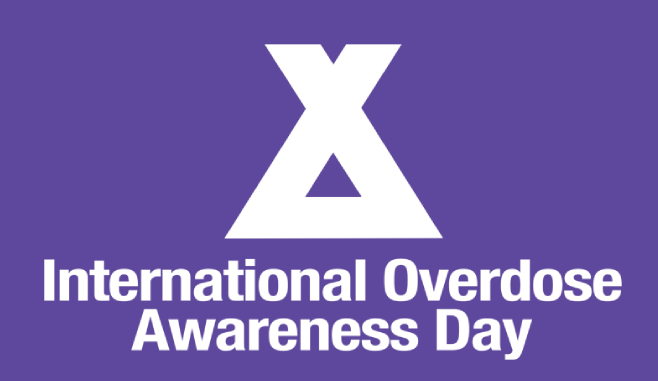To support Overdose Awareness Day on 31st August, we are taking an in-depth look at dealing with addiction in your workplace, including how to spot drug and alcohol misuse and support employees with addiction.
What is Overdose Awareness Day?
International Overdose Awareness Day (IOAD) is a global, annual campaign to end overdose, remember those who have died from an overdose, and honour their loved ones’ grief.
The campaign has been running since 2001 and aims to raise awareness of overdose as a public health crisis and to prevent overdose and reduce harm, including actioning for changes to drug policy, providing information, and creating a safe space for those dealing with addiction – whether their own or a loved one’s.

In recent decades, drug overdose deaths have seen a significant increase in many parts of the world with a record number of deaths being reported, year-on-year. In 2020, an estimated 284 million people worldwide had used a drug in the preceding year – a 26 % increase from 2010. You can find more statistics here.
The IOAD campaign, now overseen by The Penington Institute, has a specific theme each year and in 2023, the focus is ‘Recognizing those who go unseen.’ IOAD hopes to identify and acknowledge people who are affected by drug addiction and overdose but might go unseen in society.
What is an Overdose?
An overdose can occur from an excessive dose of any drug and happens when there is more of one type of drug – or a combination of drugs – in a person’s body than it can safely handle.
Any drug can cause an overdose, including over-the-counter medication and prescribed drugs as well as recreational and illegal drugs. Drug overdoses can be both fatal and non-fatal and either intentional or unintentional (i.e. accidental).
Overdoses can look different depending on the type and quantity of drugs taken, and overdose is an issue that affects millions of people globally from all walks of life.
How to Spot Addiction in Employees
People struggling with addiction can become very adept at hiding their addiction from those around them. This can include their employer and colleagues, as well as family and friends. Spotting addiction in employees, therefore, isn’t always as easy as you might imagine but there are some signs to look out for that may indicate a problem with drugs or alcohol.
It is worth remembering that addiction does not discriminate. Our unconscious bias can sometimes come into play because an employee doesn’t ‘look’ like a stereotypical addict.
Conversely, these indicators in isolation do not certify an employee as an addict and you should not ‘accuse’ anyone based on just the below.
As the HSE points out, misuse is not the same as dependence and many other factors, including stress, could be causing these changes.
Change In Performance
You may notice that an employee battling with addiction begins to make small mistakes or errors in judgement at work. They may seem to have difficulty remembering key information or struggle to concentrate. You may notice a reduction in productivity and an increase in workplace accidents or near-misses. This may be more obvious in some workplaces, where performance is easily measurable on a day-to-day basis but more subtle in other environments.
Behaviour
A sudden change in behaviour or an employee acting out of character could be due to substance abuse issues. This might include:
- Lack of interest in work or usual activities
- Secretive or suspicious behaviour
- Turning up to work late, or not at all
- An increase in sickness and absence
- Conduct issues
- Risk-taking behaviours inside or outside of the workplace, for example, doing things that would put their employment in jeopardy or placing their lives/the lives of others at risk, for example by speeding or driving under the influence
Physical Signs
Signs that an employee is abusing drugs in the workplace might include:
- Swaying, staggering or generally seeming unsteady
- Slowed movements and speech
- Seeming hyperactive, jittery or fidgety
- Changes to physical appearance, such as a lowering of hygiene standards, failure to comply with uniform policy or lack of interest in personal grooming
- An obvious smell, that may point to recent drug misuse, for example, smelling of alcohol, tobacco or marijuana
- Bloodshot or watery eyes, pinpoint or large pupils
- Very pale or flushed skin
- Excessive sweating
Personality Changes
Another indicator of addiction in an employee is any changes to their personality. For example, if a typically laid-back, easy-going colleague becomes suddenly paranoid and anxious or if an employee exhibits drastic mood swings.

What Does the Law Say About Drug and Alcohol Use at Work?
Whilst it is not an employer’s responsibility to diagnose or treat substance addiction, as an employer, you can be found liable in a court of law if it’s demonstrated that you have knowingly allowed drug-related activities in the workplace without acting.
Surprisingly, it’s not illegal for employees to be intoxicated at work – there are no specific laws around this so it’s down to employers to make their own company policies clear. However, in some industries, specific laws would prohibit intoxication. For example, under the Transport and Works Act 1992 or the Road Traffic Act 1988, a bus driver would not be permitted to drink on the job!
How to Manage Drug and Alcohol Misuse in the Workplace
Employers have a legal responsibility to look after their employees’ health, safety and wellbeing in the workplace. Having a greater understanding of drug and alcohol misuse and addiction will help you to manage the health and safety risk in your workplace and develop a robust policy to deal with any issues or concerns and support your employees, which will ultimately have a positive impact on your business.
Safety First
The safety of yourself, your staff and clients and customers should always come first. Therefore, it’s vital to consider the work environment and any areas where drug or alcohol misuse could have a serious or potentially fatal outcome.
Depending on your industry, this might involve driving, using machinery or specialist equipment, working at heights, or even situations where your employees are responsible for the safety of others, for example, caring for children or vulnerable adults, or dispensing medications.
If an employee is identified as having an addiction or you know – or suspect – them to be abusing drugs or alcohol, you should consider whether it would be safer to remove them from such duties temporarily whilst they seek help. In a situation like this, you may need to seek advice from an HR professional to determine the most appropriate action.
Staff Training
Raising awareness of addiction can help employees support each other and more easily recognise potential issues with colleagues and encourage them to seek help. Staff training about drug and alcohol misuse and dependency will help employees identify if someone they know – or perhaps even themselves – has a problem and helps to remove some of the shame and stigma associated with addiction.
A Drugs and Alcohol Policy
Even if there is no evidence of drug use in your workplace, a robust drugs and alcohol policy is a must for any company. Your policy should be developed in consultation with your staff, HR consultants, health and safety advisors and your occupational health department.
A good drugs and alcohol policy should inform employees about the rules surrounding the use of drugs or alcohol at work and apply to all controlled drugs and substances including prescribed medication, illegal drugs and ‘legal highs’.
The policy should offer advice to employees who are struggling with substance misuse or addiction and include signposting to support networks. It should also outline the potential consequences of drug and alcohol misuse in the workplace such as disciplinary or legal action.
Your policy should be clearly worded and apply to all employees equally. Having a drugs and alcohol policy in place ensures that should issues arise, they can be dealt with swiftly, fairly, and in a way that upholds your legal obligations as an employer as well as protects the health, safety and wellbeing of the individual and your other employees.
If staff are aware of the drugs and alcohol policy, it can also give them the courage to seek help or advice, whether for themselves or others, knowing that support will be forthcoming.
If you choose to use screening and testing for drugs and alcohol in your workplace, this should also be included in your drugs and alcohol policy.
Screening Employees For Drug Use
Screening is a way of checking whether employees have drugs or alcohol in their system and most often, will involve the individual providing a urine sample for testing.
Employers need to be sure that any screening for drugs and alcohol is done lawfully and fairly. As an employer, you need an employee’s permission to carry out the test and need to have a clear reason for doing so, meaning it should be an existing part of policy. Employees should also be aware of the consequences of undergoing or refusing the screening, including any disciplinary or legal action they may face.
If a situation warrants it, an employee can be singled out for testing, but employers should carefully think about this beforehand to ensure they have a reasonable justification. It may be better to have a policy already in place that states testing will be carried out automatically at designated intervals, for example, routine monthly testing for safety critical roles or randomly assigned tests.
Assess the Work Environment
In some cases, employees may be misusing drugs and/or alcohol in an attempt to cope with work-related stress. If there is addiction or drug misuse in your workplace, then it’s a good idea to assess the working environment and culture to identify if this might be part of a wider issue.
You should also review the individual’s role and responsibilities to ensure that their workload is not exacerbating their stress levels and contributing to their problem.
How to Support Colleagues With Addiction
If an employee has been identified as having an addiction to drugs or alcohol, then this needs to be approached sensitively, fairly and with compassion to ensure a favourable outcome both for the employee and the organisation.
Safety
As previously mentioned, the safety of your employees and clients is paramount, therefore if an employee is known or suspected to be battling addiction and is in a role where this could impact the health and safety of either themselves or others, they should be removed from such duties while they are supported to seek help.
Compassion and Understanding
Even when confronted with clear evidence of their addiction, it can be difficult for those battling with drug or alcohol misuse to admit that they have a problem or to acknowledge the extent of the issue.
For an individual to engage with any attempts to help them, they first need to admit that they need help. An employee who doesn’t feel that their drug use or alcohol consumption is a concern will be resistant to any attempts to demonstrate otherwise and unlikely to accept any support offered.
Many employees will also be fearful of disciplinary or legal action and so may be reluctant to admit the true extent of their addiction. This is why compassion and understanding on the part of an employer is so crucial, and where a clear drugs and alcohol policy can be useful.
If an individual knows they will be supported and treated fairly rather than immediately dismissed, they are much more likely to be honest and commit to their recovery.

Communication
Typically, addiction stems from other issues that may need to be dealt with if recovery is to be possible. This might be grief, relationship breakdowns, domestic abuse, financial stress, health concerns or the pressures of being a carer.
Issues within the work environment itself such as bullying, harassment or undue stress may also contribute to drug and alcohol misuse. Therefore employers need to communicate with staff when concerns arise and to keep channels of communication open so they feel able to disclose such matters.
Occupational Health
When supporting an employee with addiction, you should consult your occupational health department for advice or to work in conjunction with their own healthcare provider such as their GP practice or medical team.
Referral to External Services
Where appropriate consider recommending that the employee refers themselves to external services, such as an addiction treatment centre or service provider or other organisations and services, such as counselling, bereavement or signposting to relevant support networks.
A Clear Plan
Together with the employee, a clear plan should be made that details what is expected of the employee and what support will be offered from you as an employer. This might include a period of leave to attend rehab or time off to attend appointments and support groups. The plan should set out an agreed timeframe for review and detail any next steps.
A Return To Work Plan
Returning to work can be daunting for an employee in recovery and they may struggle with a lack of confidence or feelings of shame or embarrassment. A return-to-work plan can be of great help both for the employee and you, the employer.
This might involve regular check-ins with their line manager or an HR advisor to identify any issues that might arise, a staggered return to their usual working hours or duties to allow them time to settle back in and flexibility around working patterns to enable them to continue with any medical appointments or counselling.
As an employer, you should also be clear about how their performance will be monitored and how any future concerns or relapses will be dealt with.
Support For Other Employees
As highlighted by the International Overdose Awareness Day Campaign, drug and alcohol misuse doesn’t just affect the individual with the addiction, but those around them too. This can include employees, who may have been affected both directly and indirectly by their colleague’s drug or alcohol use.
If an employee is identified as having an addiction problem, then as an employer you may also want to consider offering support to your other employees, whether informally or formally. This could include self-referral to counselling services, or a team or individual debrief if there has been a significant incident relating to drug or alcohol misuse in the workplace.
Outsourced HR Services
As an employer dealing with addiction in the workplace, outsourced HR services can be incredibly helpful. External HR advisors are impartial, enabling them to identify issues – and potential solutions – without being influenced by interpersonal factors.
When it comes to sensitive and serious matters like drug and alcohol addiction, the support and expertise of HR services can ensure that both employees and employers are supported to find a way forward that protects the health, safety and wellbeing of all staff.
Outsourced HR services can also help to formulate a clear plan, including adjustments to an employee’s duties and ways of monitoring progress that are fair and reasonable, in order to achieve the best possible outcome for all concerned.
Get Advice From Your Local HR Specialists
Metis HR provide specialist HR advice that is uniquely tailored to your specific needs and concerns. We work with you to reach a considered decision that is best for your business.
If you need advice on dealing with addiction in your workplace or want to know more about the services we offer, just get in touch with the experts at Metis HR.
Send us a message via info@metishr.co.uk or, if you would prefer to speak directly to an experienced HR Consultant, call us on 01706 565 332. We look forward to hearing from you.

